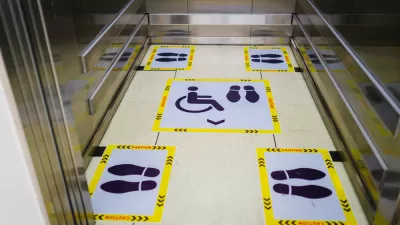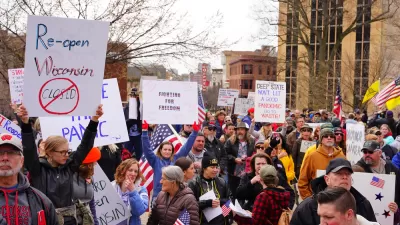Initial research on social isolation as a method to combat contagious disease included a high-school science fair project modeling social networks. Doctors learned that the spread of disease could be decelerated by disrupting these networks.

Most people became aware of social distancing when guidelines and restrictions related to reducing the spread of the coronavirus circulated worldwide. In a New York Times piece, Eric Lipton and Jennifer Steinhauer tell the origin story of the concept of social distancing—a story that began about a decade and a half ago when George W. Bush, concerned by bioterrorism, requested research to ensure that the United States would be prepared in the event of an outbreak of infectious disease.
When Department of Veterans Affairs physician Dr. Mecher and oncologist and White House advisor Dr. Hatchett presented their research on previous pandemic outbreaks, they received what Dr. Mecher politely describes as an "ugly" response.
"When they presented their plan not long after, it was met with skepticism and a degree of ridicule by senior officials, who like others in the United States had grown accustomed to relying on the pharmaceutical industry, with its ever-growing array of new treatments, to confront evolving health challenges," explain Lipton and Steinhauer. Despite resistance, the Bush administration and the Centers for Disease Control adopted the Non-Pharmaceutical Interventions or NPI as official policy.
FULL STORY: The Untold Story of the Birth of Social Distancing

Maui's Vacation Rental Debate Turns Ugly
Verbal attacks, misinformation campaigns and fistfights plague a high-stakes debate to convert thousands of vacation rentals into long-term housing.

Planetizen Federal Action Tracker
A weekly monitor of how Trump’s orders and actions are impacting planners and planning in America.

In Urban Planning, AI Prompting Could be the New Design Thinking
Creativity has long been key to great urban design. What if we see AI as our new creative partner?

King County Supportive Housing Program Offers Hope for Unhoused Residents
The county is taking a ‘Housing First’ approach that prioritizes getting people into housing, then offering wraparound supportive services.

Researchers Use AI to Get Clearer Picture of US Housing
Analysts are using artificial intelligence to supercharge their research by allowing them to comb through data faster. Though these AI tools can be error prone, they save time and housing researchers are optimistic about the future.

Making Shared Micromobility More Inclusive
Cities and shared mobility system operators can do more to include people with disabilities in planning and operations, per a new report.
Urban Design for Planners 1: Software Tools
This six-course series explores essential urban design concepts using open source software and equips planners with the tools they need to participate fully in the urban design process.
Planning for Universal Design
Learn the tools for implementing Universal Design in planning regulations.
planning NEXT
Appalachian Highlands Housing Partners
Mpact (founded as Rail~Volution)
City of Camden Redevelopment Agency
City of Astoria
City of Portland
City of Laramie





























